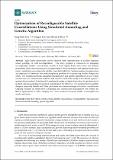| dc.contributor.author | Paek, Sung Wook | |
| dc.contributor.author | Kim, Sangtae | |
| dc.contributor.author | De Weck, Olivier L | |
| dc.date.accessioned | 2019-03-11T15:27:52Z | |
| dc.date.available | 2019-03-11T15:27:52Z | |
| dc.date.issued | 2019-02 | |
| dc.date.submitted | 2019-02 | |
| dc.identifier.issn | 1424-8220 | |
| dc.identifier.uri | http://hdl.handle.net/1721.1/120855 | |
| dc.description.abstract | Agile Earth observation can be achieved with responsiveness in satellite launches, sensor pointing, or orbit reconfiguration. This study presents a framework for designing reconfigurable satellite constellations capable of both regular Earth observation and disaster monitoring. These observation modes are termed global observation mode and regional observation mode, constituting a reconfigurable satellite constellation (ReCon). Systems engineering approaches are employed to formulate this multidisciplinary problem of co-optimizing satellite design and orbits. Two heuristic methods, simulated annealing (SA) and genetic algorithm (GA), are widely used for discrete combinatorial problems and therefore used in this study to benchmark against a gradient-based method. Point-based SA performed similar or slightly better than the gradient-based method, whereas population-based GA outperformed the other two. The resultant ReCon satellite design is physically feasible and offers performance-to-cost(mass) superior to static constellations. Ongoing research on observation scheduling and constellation management will extend the ReCon applications to radar imaging and radio occultation beyond visible wavelengths and nearby spectrums. Keywords: Earth observation; remote sensing; satellite constellation; reconfigurability; repeat ground tracks; simulated annealing; genetic algorithm | en_US |
| dc.publisher | Multidisciplinary Digital Publishing Institute | en_US |
| dc.relation.isversionof | http://dx.doi.org/10.3390/s19040765 | en_US |
| dc.rights | Creative Commons Attribution | en_US |
| dc.rights.uri | https://creativecommons.org/licenses/by/4.0/ | en_US |
| dc.source | Multidisciplinary Digital Publishing Institute | en_US |
| dc.title | Optimization of Reconfigurable Satellite Constellations Using Simulated Annealing and Genetic Algorithm | en_US |
| dc.type | Article | en_US |
| dc.identifier.citation | Paek, Sung et al. "Optimization of Reconfigurable Satellite Constellations Using Simulated Annealing and Genetic Algorithm." Sensors 19, 4 (February 2019): 765 © 2019 The Authors | en_US |
| dc.contributor.department | Massachusetts Institute of Technology. Department of Aeronautics and Astronautics | en_US |
| dc.contributor.mitauthor | De Weck, Olivier L | |
| dc.relation.journal | Sensors | en_US |
| dc.eprint.version | Final published version | en_US |
| dc.type.uri | http://purl.org/eprint/type/JournalArticle | en_US |
| eprint.status | http://purl.org/eprint/status/PeerReviewed | en_US |
| dc.date.updated | 2019-02-15T07:53:50Z | |
| dspace.orderedauthors | Paek, Sung; Kim, Sangtae; de Weck, Olivier | en_US |
| dspace.embargo.terms | N | en_US |
| dc.identifier.orcid | https://orcid.org/0000-0001-6677-383X | |
| mit.license | PUBLISHER_CC | en_US |
